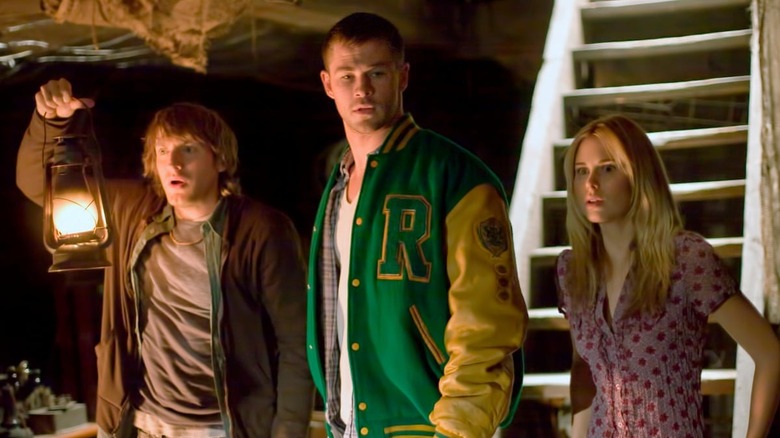The Cabin In The Woods Lawsuit That Had Fans Scratching Their Heads
Drew Goddard's "The Cabin in the Woods" stands as one of the most original horror movies in recent years. Earning a place in the same conversation as classics like "The Evil Dead" and "The Blair Witch Project," the Joss Whedon-co-written and produced fright film was a ferociously fun time, packing a twist we never saw coming — well, some of us. The film follows a group of teenagers who take a trip out to the titular location, only to find all manner of horrific elements hidden in and around its walls, just waiting to wipe them out. Things get even stranger, though, as the film — which harkens back to all the other scare-fests set in familiar settings — quickly becomes something else entirely. Viewers soon learn that a mysterious organization controls everything and anything trying to tear them apart, all to satisfy an even greater evil.
"The Cabin in the Woods" earned $66.5 million at the box office and was met with rave reviews for taking classic tropes and pushing them through a well-oiled meta-machine that no one predicted. No one, it seems, but a writer who claimed Whedon and Lionsgate stole core elements from a story he'd written years before.
The trial of terror saved by laughs
In 2015, writer Peter Gallagher filed a lawsuit with the U.S. district court in California, making a claim for $10 million in damages, according to The Wrap. He believed that the film was a dead ringer for his story, "The Little White Trip: A Night in the Pines," published in 2006 and registered with the Writers Guild of America in 2007. Stated in the claim as "virtually identical," the story saw some young friends visit a cabin home where a crazed father murdered his entire family the year before. As luck would have it, the demented Dad returns to the home during their visit to increase his kill count. Just like "The Cabin in the Woods," the teenagers learn their night of terror is being orchestrated, and that every dance with death is for the amusement of an audience watching the whole thing.
The comparisons were shockingly similar to Gallagher's book, but Goddard, who co-wrote the film with Whedon, had revealed in the past real-life events inspired "The Cabin in the Woods." Growing up in Los Alamos, New Mexico, he posited that his hometown was only around "because it's a government lab that designs weapons. And that's the only reason the town exists."
The case was dismissed after being checked over by a judge five months after the claim was made. "While the two works share a common premise of students travelling to remote locations and subsequently being murdered, real or otherwise, that premise is unprotectable. The concept of young people venturing off to such locations and being murdered by some evil force is common in horror films," the judge said (via Entertainment Weekly). So ultimately, there were a number of stories that saw carnage in cabins, but it was the laughs in Goddard and Whedon's particular tale that separated them from Gallagher's.

